Venezuela and the US’s ‘failed’ war on drugs
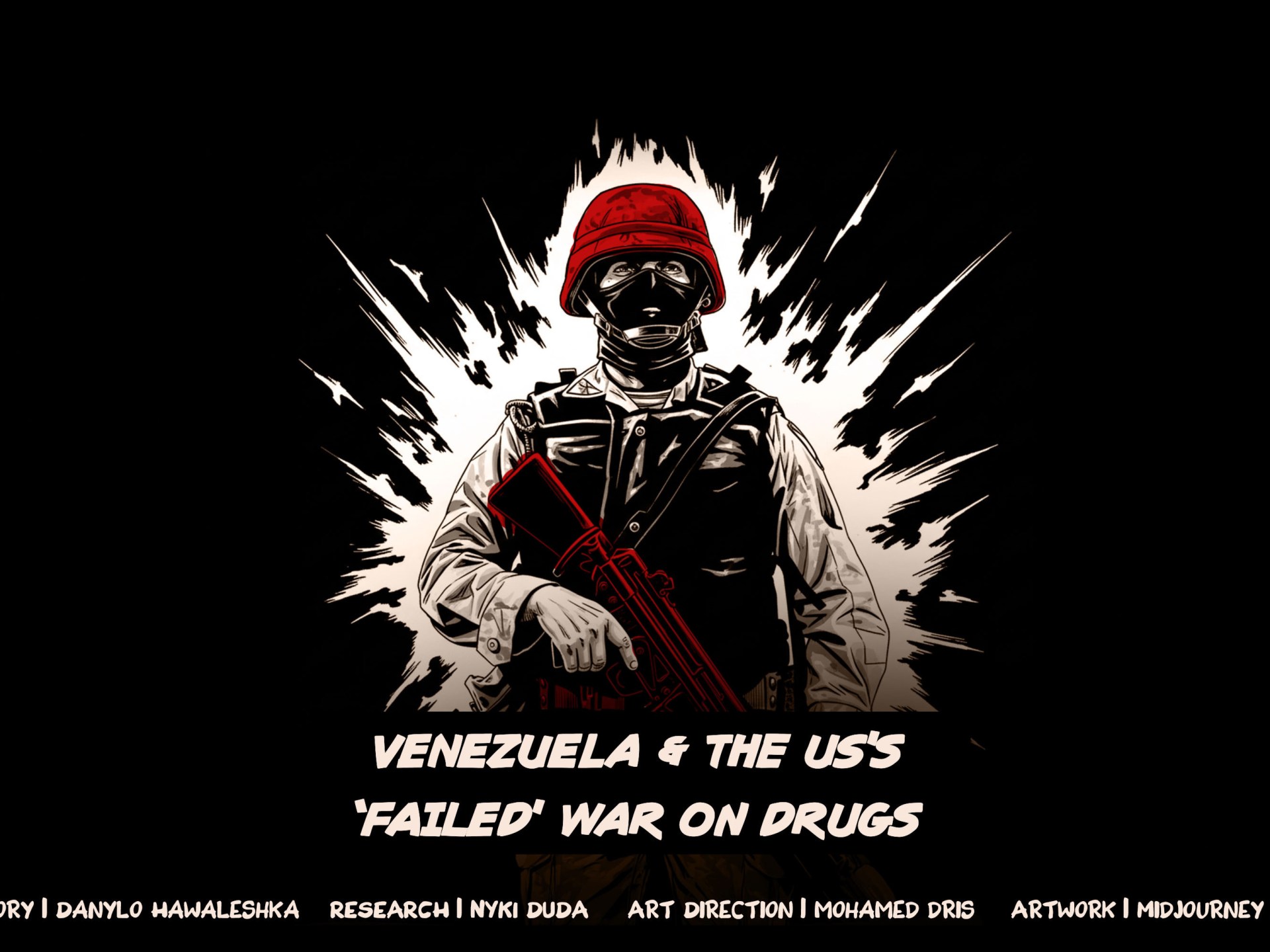

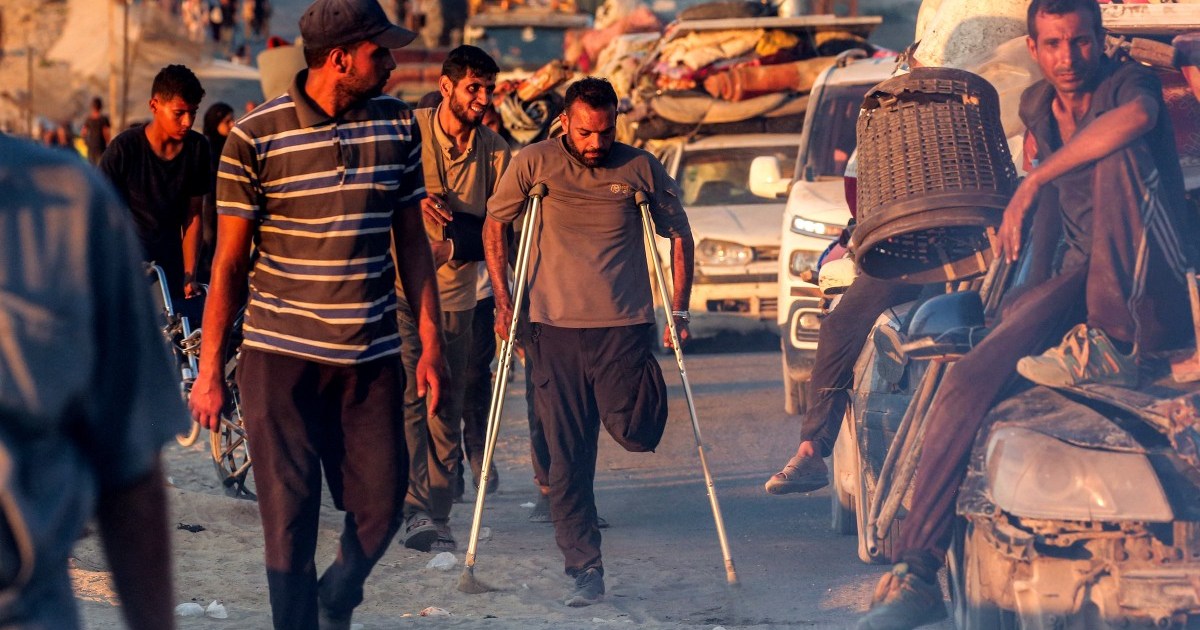
The Israeli army is intensifying its military operations in Gaza City, threatening Palestinians to evacuate southwards as attacks accelerate.
According to an army post on X, more than 250,000 people have reportedly fled the city. The military is urging remaining residents to travel via al-Rashid Street towards al-Mawasi or camps in central Gaza.
However, Al Jazeera’s Hani Mahmoud said, “Despite intense bombardment in Gaza City, many residents have stayed put – or returned after seeking shelter elsewhere – because many of Israel’s designated evacuation zones are desperately overcrowded and under-resourced, including lacking proper water access.”
The United Nations estimates from late August indicated approximately one million Palestinians were living in and around Gaza’s largest urban centre, where famine conditions are taking hold after months of deteriorating circumstances.
The UN and international community have called on Israel to abandon its plans to capture the city, warning that such an assault could worsen the humanitarian crisis.
Israeli army’s Arabic-language spokesman Avichay Adraee claimed on Saturday on X: “More than a quarter of a million residents of Gaza City have moved out of the city for their own safety.” Gaza’s Civil Defence agency contradicted this figure, reporting fewer than 70,000 people had managed to leave.
The Israeli military dropped leaflets Saturday, warning western district residents to evacuate amid continuous air raids. “The Israeli army is operating with very intense force in your area and is determined to dismantle and defeat Hamas,” the leaflets stated. “You have been warned.”
Mohammad Abu Salmiya, head of the al-Shifa Hospital, told the AFP news agency that while displacement continues within Gaza City, “only a small number of people have been able to reach the south”. He added that those who do flee south often find nowhere to stay, as “the al-Mawasi area is completely full and Deir el-Balah is also overcrowded”, causing many to return to Gaza City.
Civil Defence spokesman Mahmoud Basal told AFP, “The actual number of displaced people from Gaza to the south is approximately 68,000 only. Many residents are still holding their ground, and many others cannot find space in the south.”
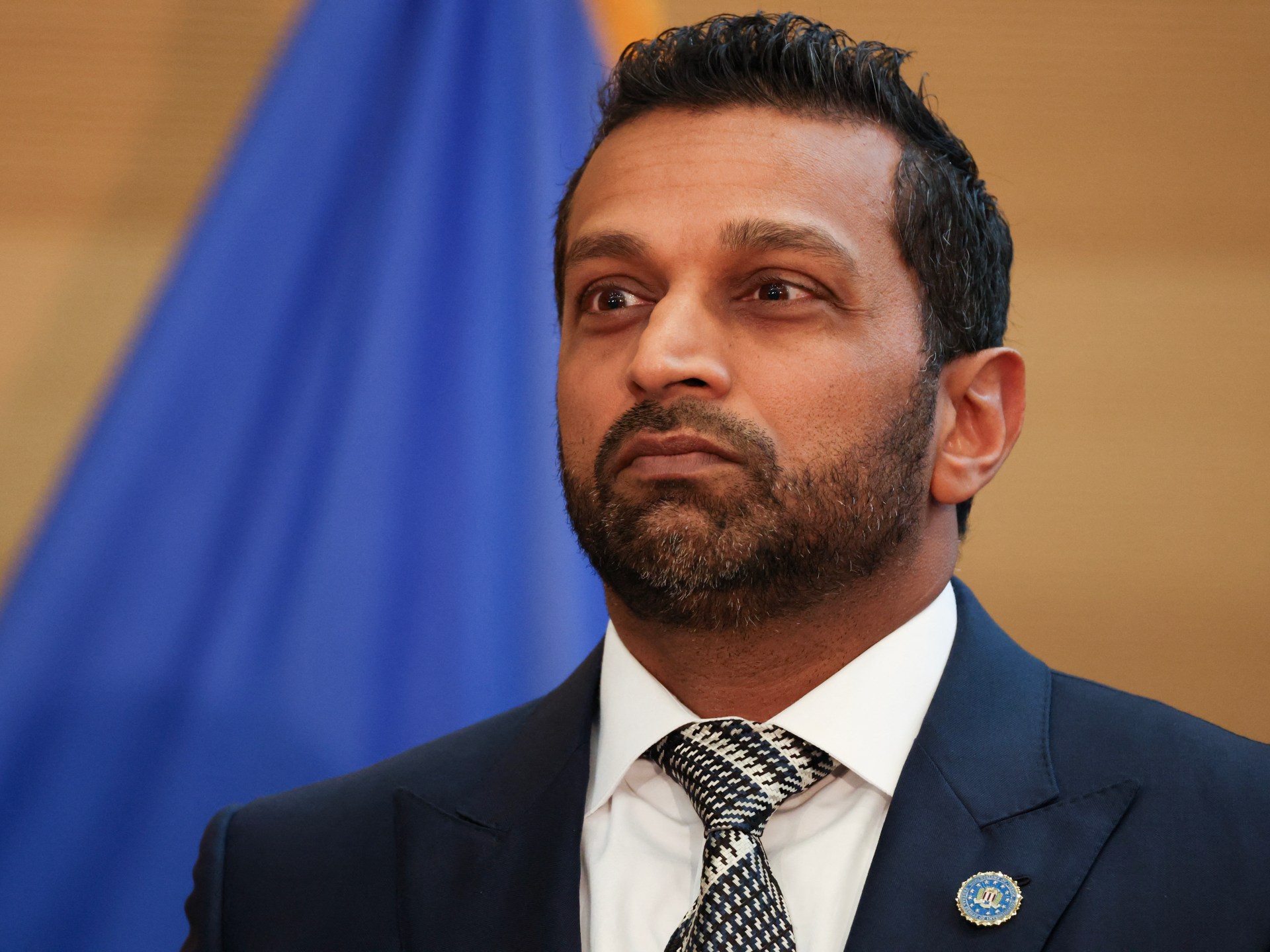
FBI Director Kash Patel is bracing for United States congressional scrutiny over his leadership of the investigation into the killing of conservative commentator Charlie Kirk, following early reported missteps, including his erroneous announcement on social media that “the subject” in the killing was in custody.
Patel is set to appear on Tuesday and Wednesday before the Senate and House judiciary committees, during which he is expected to answer questions not just about how the FBI handled the Kirk case, but also whether he can stabilise an agency fragmented by political fights and internal upheaval since his appointment, as toxic political divisions plague the nation.
list of 3 itemsend of list
US President Donald Trump praised Patel on Saturday for the speed with which the bureau identified and captured Kirk’s alleged assassin, Tyler Robinson.
But that has not stopped criticism even from fellow conservatives, who have started to wonder if Patel is qualified to head the country’s top law enforcement body of 38,000 employees, including 13,000 agents.
In a statement posted on X on Friday, Christopher F Rufo, a fellow at the conservative think tank Manhattan Institute, wrote that it was “time for Republicans to assess whether Kash Patel is the right man to run the FBI”.
“He performed terribly in the last few days, and it’s not clear whether he has the operational expertise to investigate, infiltrate, and disrupt the violent movements — of whatever ideology — that threaten the peace in the United States,” he added.
“I’ve been on the phone the last few days with many conservative leaders, all of whom wholeheartedly support the Trump Administration and none of whom are confident that the current structure of the FBI is up to this task,” Rufo further said.
Conservative commentator Erick Erickson also weighed in, writing on X, “The FBI situation is concerning.”
An earlier report by The Guardian newspaper said Patel was also ridiculed by far-right groups for his “clumsy response” to Kirk’s killing.
The latest questions on Patel’s qualifications arose hours after Kirk’s killing.
While agents investigated, Patel posted on X: “The subject for the horrific shooting today that took the life of Charlie Kirk is now in custody.” It turned out to be wrong. Patel soon after posted that the person in custody had been released.
Senate Minority Whip Dick Durbin, a Republican, described Patel’s misstep as “amateur hour” and questioned his professionalism.
As the search stretched on, Patel angrily vented to FBI personnel on Thursday about what he perceived as a failure to keep him informed, including that he was not quickly shown a photograph of the suspected shooter, according to The Associated Press news agency.
The day Kirk was killed, Patel also faced a lawsuit from three FBI senior executives fired in an August purge that they characterised as a Trump administration retribution campaign.
Among them was Brian Driscoll, who, as acting FBI director in the early days of the Trump administration, resisted Department of Justice demands for names of agents who investigated the January 6, 2021 riot at the US Capitol.
Driscoll alleged in the lawsuit that he was let go after he challenged the leadership’s desire to terminate an FBI pilot who had been wrongly identified on social media as having been part of the agency’s search for classified documents at Trump’s Mar-a-Lago estate.
Patel is also facing other questions, including his pursuit of Trump’s grievances long after the Russia investigation ended, and a realignment of resources that has prioritised the fight against illegal immigration and street crime.
“Because of the scepticism that some members of the Senate have had and still have, it’s extremely important that he perform very well at these oversight hearings,” said Gregory Brower, the FBI’s former top congressional affairs official.
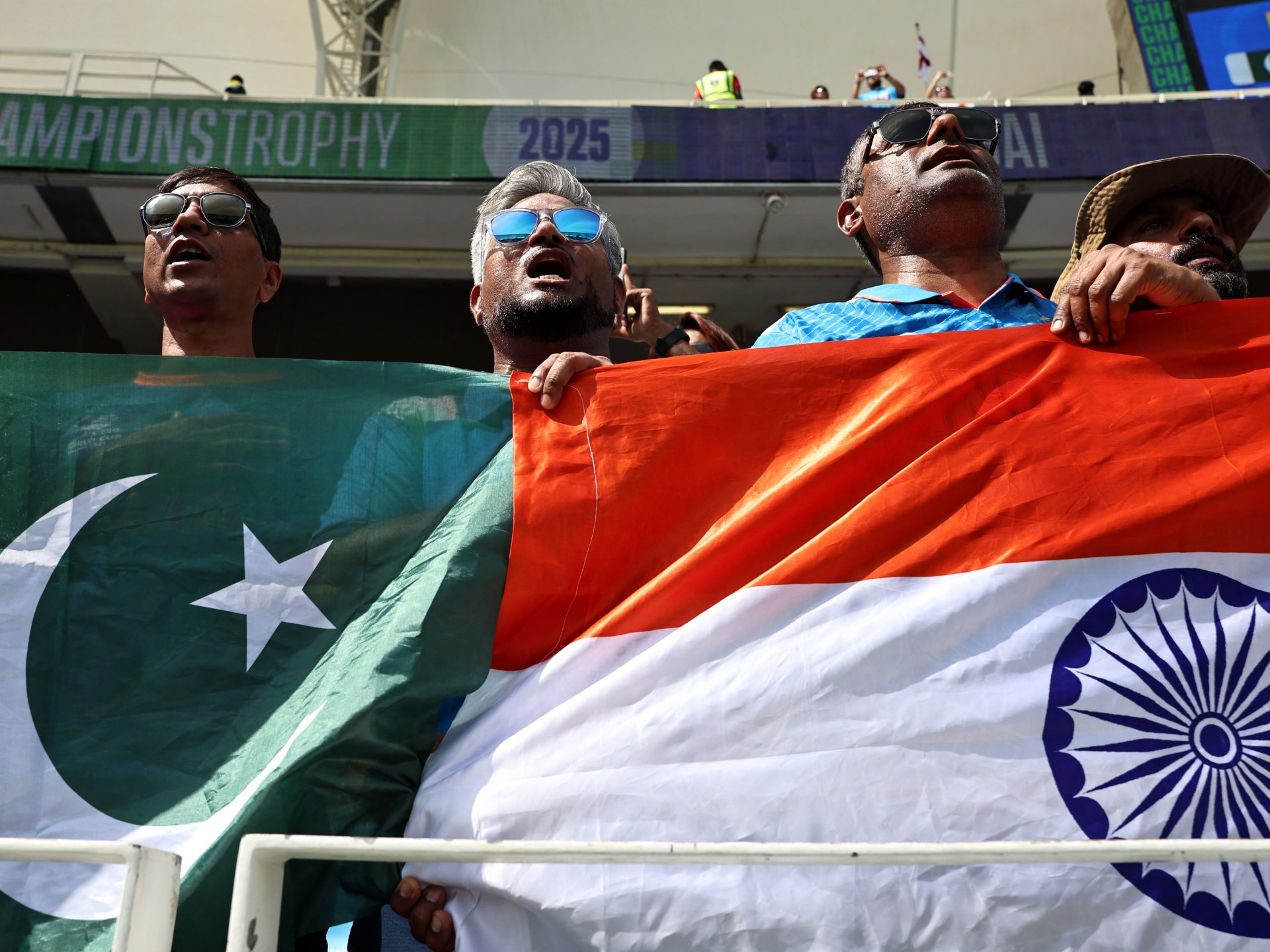
Dubai, United Arab Emirates – Hundreds of tickets for the India vs Pakistan cricket match at the Asia Cup 2025 in Dubai remain unsold on the morning of the fixture, a rare occurrence for a cricket match between the South Asian archrivals.
With less than eight hours before the start of the 6:30pm (14:30 GMT) game, tickets were available on Sunday in three stands and one hospitality section of the Dubai International Cricket Stadium on the tournament’s official ticketing website.
list of 4 itemsend of list
Tickets priced at $205 in the premium stand, as well as those costing $245 in the east and west pavilion stands, were available in their dozens.
Seats were also available in one of the several hospitality stands, costing $1,645 apiece.
While the tournament’s organisers – the Asian Cricket Council (ACC) and the Emirates Cricket Board (ECB) – have not made an official comment on the unsold tickets, local fans blame the hot weather in the Gulf nation as a major discouraging factor.
“September is one of the hottest months in this part of the world, with high temperatures and extreme humidity, making it difficult to be outdoors even in the evenings,” Shahid Khan, a Dubai resident, told Al Jazeera.
“While players may get paid to play in this weather, fans have to spend large amounts of money to purchase tickets. Why would they do that to suffer in the heat?”
The temperature in the evening, close to the match start time, is forecast at 36C (95F), with humidity touching 50 percent.
Al Jazeera reached out to the ACC but was told the official ticket sale figures would be confirmed once the match gets under way and no comment would be made on the sales until then.
Cricket experts believe the highly strained political relations between India and Pakistan, who were involved in an intense four-day cross-border conflict in May, are also to be blamed.
“Some fans have decided to boycott the fixture in order to register their protest against their government’s decision to go ahead with the match despite the ongoing bitterness against the neighbour,” Indian cricket writer Kuldip Lal told Al Jazeera in the lead-up to the match.
While it is not unusual to spot vacant seats in cricket matches in the UAE, tickets for an India-Pakistan men’s cricket match in any part of the world sell like hot cakes on most occasions.
Typically, tickets sell out within a few hours of going on sale, especially for global and regional tournaments such as ICC World Cups or the Asia Cup.
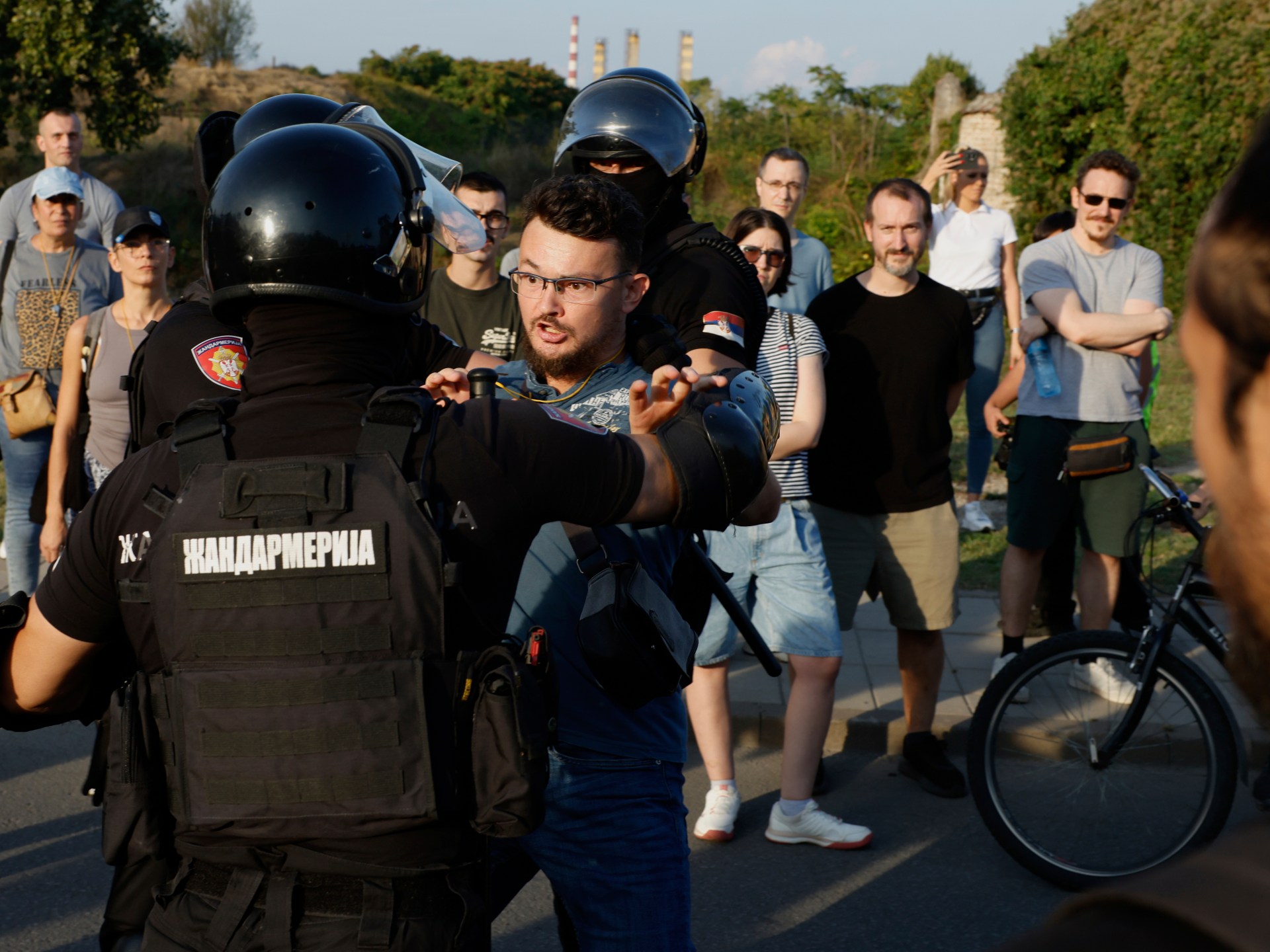
Serbia continues to be gripped by a deep political crisis, with antigovernment protesters and supporters of President Aleksandar Vucic holding parallel rallies across the Balkan country.
Both sides held events on Saturday, more than 10 months into sustained protests against the right-wing populist government that were triggered by the collapse of a railway station roof in the northern city of Novi Sad, killing 16 people.
list of 2 itemsend of list
At first, the student-led protest movement sought justice for the victims and an investigation into the corruption said to have caused the tragedy. However, its demands then increased to calling for Vucic’s resignation.
Vucic, who dismisses the protesters as “terrorists”, has used his Serbian Progressive Party to recently organise counterdemonstrations in a bid to maintain his firm grip on power.
No major incidents were declared on Saturday, but brief scuffles were reported in the capital, Belgrade, where antigovernment demonstrators were pushed away by riot police as Vucic joined some of his supporters.
Earlier in the week, thousands gathered in Belgrade to protest against the government.
Addressing the crowd, Nikolina Sindjelic, a student who was arrested during protests in August, claimed she was mistreated in detention.
“They beat us because they are afraid of us,” she said, standing outside the headquarters of a special police unit.
“They have hit us and they will hit us because they know it is all over [for them],” Sindjelic added.
The government’s crackdown on the protest movement has increased in recent weeks, with demonstrators accusing the police of brutality.
So far, more than 100 university professors have been sacked by the authorities and replaced with Vucic loyalists.
“We have a problem in Belgrade,” European Commissioner for Enlargement Marta Kos said during a trip to Austria on September 8.
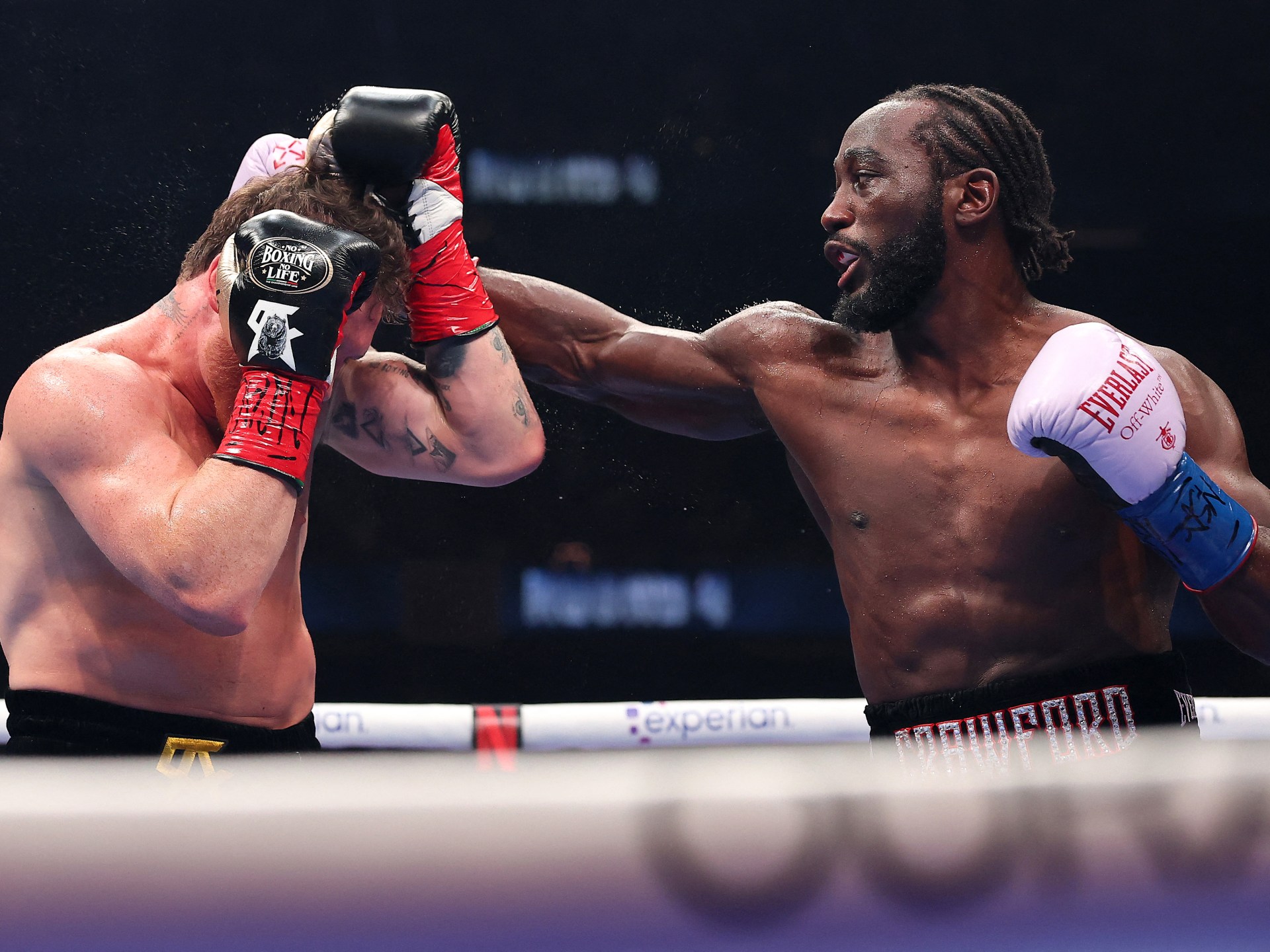
Terence Crawford has clinched a unanimous victory over Saul “Canelo” Alvarez to become the undisputed super middleweight champion in a thrilling contest at Allegiant Stadium in Las Vegas.
Crawford set the pace from the start on Saturday night with a measured display that showcased his incredible hand speed and precise footwork, as the judges scored the fight 116-112, 115-113 and 115-113 in favour of the American.
list of 4 itemsend of list
The victory made Crawford the first male boxer to be crowned an undisputed champion in three different weight classes.
“I’m not here by coincidence. Canelo is a great champion. I have to take my hat off to him. He’s a great competitor, and I have great respect for him. He fought like a champion,” said Crawford, who was in tears after his win was announced.
Asked if he would fight again, he said: “I don’t know, I have to sit down with my team and we’ll talk about it.
“I want to say thank you to all the supporters and the haters. I appreciate you all. Shout out to my fans and those supporting Canelo. We get to go home to our children.”
With Alvarez and Crawford both having been recognised as the world’s top pound-for-pound boxers in the past, the fight always promised to be a boxing masterclass.
The pair delivered an entertaining battle that had more than 70,000 people in attendance and millions on Netflix watching with bated breath throughout the 12-round showcase.
Crawford, a former undisputed champion at both light welterweight and welterweight, as well as a four-division world champion, stepped up two weight classes for the bout.
He tipped the scales at a career-high 167.5 pounds (75.98 kg) at the weigh-in on Friday, the same as Alvarez, but that step-up did not appear to affect his mobility.
Keenly aware of his opponent’s superior power, Crawford was the better boxer for much of the bout and expertly neutralised Alvarez’s offence with a treacherous balancing act.
The 37-year-old maintained his distance as he flitted in and out of danger, landing flurries of blows on his opponent. The attritional assault by the smaller boxer put Alvarez on the back foot.
The Mexican champion connected with a few body shots early on, but after being outboxed throughout the first half, he threw caution to the wind and retaliated with brute force in search of a knockout.
That knockout never came.
If anything, Crawford only grew in confidence, landing devastating combinations and absorbing any punches that sneaked through his guard as he improved his record to 42-0 (31 knockouts) and kept his remarkable unbeaten streak alive.
For Alvarez, there was pride even in defeat.
“I’m a winner for being here. The fact I’m here makes me a winner. I take risks and that’s what I did,” the 35-year-old said.
“I feel great to share the ring with great fighters like him. If we do it again, then it’ll be great. I already accomplished a lot in boxing. My legacy is already there, and I like taking risks because I love boxing.”
This fight was already being compared with some of the greatest in Las Vegas’s rich history well before the two contestants tapped gloves.
Never in question was beating the attendance record for a Las Vegas fight – previously 29,214 in 1982 for heavyweight champion Larry Holmes’s 13th-round knockout of Gerry Cooney at Caesars Palace’s specially constructed outdoor stadium – would fall on this night.
But this fight’s impact went beyond Las Vegas. Because it was on Netflix rather than pay-per-view, promoters hoped the card would draw in viewing numbers not seen since perhaps the 1970s, when big-time bouts often were on broadcast networks.
This could be more the norm going forward now that UFC President and CEO Dana White is involved in boxing, this being his first card in collaboration with fellow promoter Riyadh Season.
The Ultimate Fighting Championship (UFC) reached a seven-year deal with Paramount last month, choosing to put its product on the streaming service rather than the pay-per-view (PPV) model that combat sports have used for their most important events.
Meanwhile, on the undercard, Ireland’s Callum Walsh beat Fernando Vargas Jr, while super middleweights Christian Mbilli and Lester Martinez delivered a slugfest that ended in a draw.